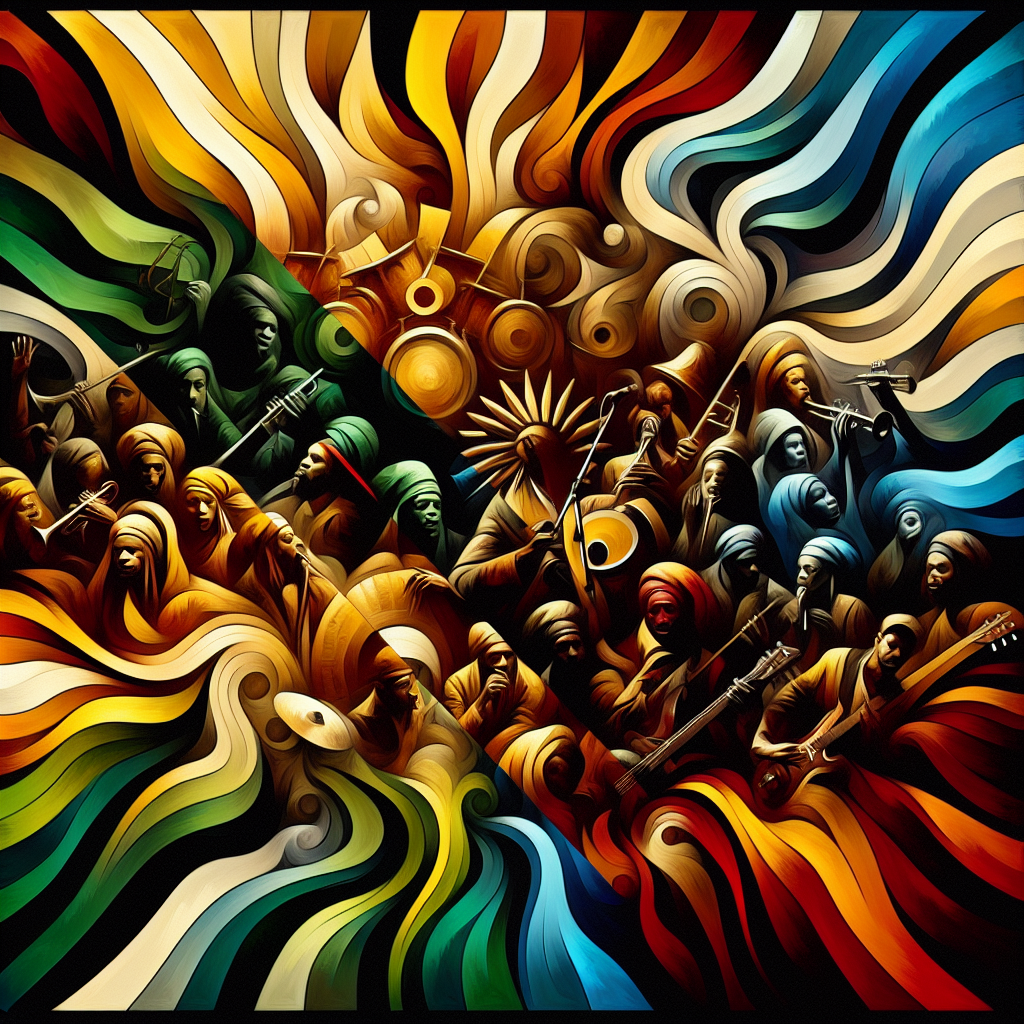-
Table of Contents
- Introduction
- Exploring the Evolution of Roots Reggae Fusion: Bridging Classic and Modern Sounds
- Key Artists Shaping the Roots Reggae Fusion Scene Today
- The Influence of Technology on Roots Reggae Fusion Music Production
- Roots Reggae Fusion: A Global Movement with Local Flavors
- Analyzing the Lyrical Themes in Roots Reggae Fusion
- The Role of Roots Reggae Fusion in Social and Political Activism
- Q&A
- Conclusion
“Roots Reggae Fusion: Timeless Vibes, Contemporary Rhythms.”
Introduction
Roots Reggae Fusion is a dynamic musical genre that seamlessly blends the foundational elements of classic reggae with contemporary influences, creating a sound that resonates with both traditionalists and modern music enthusiasts. This genre retains the soulful rhythms, deep basslines, and socially conscious lyrics that are hallmarks of classic reggae, while incorporating elements from various musical styles such as rock, jazz, hip-hop, and electronic music. The result is a vibrant and innovative sound that honors reggae’s rich cultural heritage while pushing its boundaries. Roots Reggae Fusion artists often experiment with new production techniques and diverse instrumentation, bringing a fresh edge to the timeless reggae groove. This fusion not only revitalizes the genre for new audiences but also serves as a platform for addressing current social and political issues, maintaining reggae’s legacy as a voice for change and unity.
Exploring the Evolution of Roots Reggae Fusion: Bridging Classic and Modern Sounds
Roots reggae fusion represents a fascinating evolution in the world of music, where the timeless essence of classic reggae intertwines with contemporary influences to create a sound that is both nostalgic and innovative. This genre, while deeply rooted in the traditional rhythms and themes of reggae, embraces a modern edge that appeals to a diverse audience. To understand the evolution of roots reggae fusion, it is essential to explore the foundational elements of classic reggae and how they have been adapted and transformed by modern artists.
Classic reggae, originating in Jamaica in the late 1960s, is characterized by its distinctive offbeat rhythm, soulful basslines, and socially conscious lyrics. Artists like Bob Marley, Peter Tosh, and Burning Spear used reggae as a platform to address issues of social justice, love, and unity, creating music that resonated with listeners worldwide. The genre’s emphasis on rhythm and message laid the groundwork for its enduring appeal and adaptability. As music evolved, so too did the desire to experiment and blend genres, leading to the emergence of roots reggae fusion.
In the pursuit of innovation, contemporary musicians have sought to infuse classic reggae with elements from other genres such as jazz, hip-hop, electronic, and rock. This fusion not only revitalizes the traditional sound but also expands its reach to new audiences. By incorporating diverse musical influences, artists are able to maintain the core essence of reggae while simultaneously pushing its boundaries. For instance, the integration of electronic beats and synthesizers can add a modern texture to reggae tracks, creating a soundscape that is both familiar and fresh.
Moreover, the lyrical content of roots reggae fusion often reflects the complexities of modern life, addressing contemporary issues such as globalization, environmental concerns, and digital connectivity. This thematic evolution ensures that the music remains relevant and thought-provoking, continuing the tradition of reggae as a vehicle for social commentary. The fusion of classic and modern elements allows artists to craft narratives that resonate with both long-time reggae enthusiasts and new listeners who may be discovering the genre for the first time.
The global nature of today’s music industry has also played a significant role in the evolution of roots reggae fusion. With the advent of digital platforms and social media, artists from different cultural backgrounds can collaborate and share their interpretations of reggae, leading to a rich tapestry of sounds and styles. This cross-cultural exchange not only enriches the genre but also highlights its universal appeal and adaptability. As a result, roots reggae fusion has become a truly global phenomenon, transcending geographical and cultural boundaries.
In conclusion, roots reggae fusion represents a dynamic and evolving genre that bridges the gap between classic reggae and modern musical influences. By blending traditional rhythms with contemporary sounds and themes, artists are able to create music that is both timeless and innovative. This fusion not only honors the legacy of reggae pioneers but also ensures that the genre continues to grow and resonate with audiences around the world. As roots reggae fusion continues to evolve, it will undoubtedly inspire future generations of musicians to explore new possibilities and push the boundaries of what reggae can be.
Key Artists Shaping the Roots Reggae Fusion Scene Today
Roots reggae fusion, a genre that seamlessly blends the traditional elements of classic reggae with contemporary influences, has been gaining traction in the global music scene. This innovative genre not only pays homage to the foundational sounds of reggae but also incorporates modern musical elements, creating a fresh and dynamic soundscape. At the forefront of this movement are several key artists who are shaping the roots reggae fusion scene today, each bringing their unique style and perspective to the genre.
One of the most influential artists in this space is Protoje, a Jamaican musician known for his ability to merge reggae with elements of hip-hop and jazz. Protoje’s music is characterized by its thoughtful lyrics and complex rhythms, which reflect both his deep respect for reggae’s roots and his desire to push the genre forward. His collaborations with other artists, such as Chronixx and Koffee, further exemplify his commitment to innovation within the genre. By blending traditional reggae sounds with modern influences, Protoje has become a pivotal figure in the roots reggae fusion scene.
Similarly, Chronixx has emerged as a leading voice in this genre, known for his soulful voice and socially conscious lyrics. His music often addresses themes of love, unity, and resistance, echoing the messages of classic reggae while incorporating contemporary sounds. Chronixx’s ability to connect with audiences across generations is a testament to his skill in bridging the gap between the old and the new. His work not only honors the legacy of reggae legends like Bob Marley but also introduces the genre to a new generation of listeners.
In addition to these artists, Koffee has quickly risen to prominence as a key player in the roots reggae fusion scene. Her youthful energy and innovative approach to music have captivated audiences worldwide. Koffee’s sound is a vibrant mix of reggae, dancehall, and pop, which she uses to convey messages of positivity and empowerment. Her breakout hit “Toast” exemplifies her ability to create music that is both rooted in tradition and forward-thinking. As one of the youngest artists in the genre, Koffee represents the future of roots reggae fusion, bringing a fresh perspective that continues to shape the scene.
Moreover, the influence of international artists cannot be overlooked in the evolution of roots reggae fusion. Musicians from outside Jamaica, such as Alborosie from Italy and SOJA from the United States, have contributed to the genre’s global appeal. These artists bring their own cultural influences to the music, further enriching the genre’s diversity. Alborosie’s deep respect for reggae’s history is evident in his music, which often features traditional reggae instrumentation alongside modern production techniques. Similarly, SOJA’s fusion of reggae with rock and folk elements has garnered them a wide international following, demonstrating the genre’s universal resonance.
In conclusion, the roots reggae fusion scene today is characterized by a dynamic blend of tradition and innovation, driven by artists who are unafraid to experiment with new sounds while honoring the genre’s rich history. Protoje, Chronixx, Koffee, and international artists like Alborosie and SOJA are at the forefront of this movement, each contributing to the genre’s evolution in their own unique way. As these artists continue to push the boundaries of roots reggae fusion, they ensure that the genre remains vibrant and relevant in the modern musical landscape.
The Influence of Technology on Roots Reggae Fusion Music Production

Roots reggae fusion, a genre that marries the traditional sounds of classic reggae with contemporary influences, has been significantly shaped by technological advancements in music production. This evolution is not merely a superficial change but a profound transformation that has expanded the genre’s reach and enriched its sonic palette. As technology continues to evolve, it offers new tools and techniques that artists can use to innovate while still honoring the roots of reggae music.
Initially, reggae music was characterized by its organic sound, often produced with live instruments and analog recording equipment. The warmth and authenticity of these recordings were integral to the genre’s identity. However, as digital technology began to permeate the music industry, it brought with it a suite of possibilities that were previously unimaginable. Digital audio workstations (DAWs), synthesizers, and sampling technology have allowed artists to experiment with new sounds and textures, creating a fusion that respects the genre’s origins while pushing its boundaries.
One of the most significant impacts of technology on roots reggae fusion is the ability to seamlessly blend different musical elements. Artists can now incorporate electronic beats, ambient soundscapes, and even elements from other genres such as hip-hop and electronic dance music. This fusion is facilitated by the precision and flexibility of digital tools, which allow for intricate layering and manipulation of sounds. Consequently, producers can craft complex arrangements that maintain the rhythmic and melodic essence of reggae while introducing innovative elements that appeal to a broader audience.
Moreover, technology has democratized music production, making it more accessible to a diverse range of artists. With affordable software and hardware, musicians from various backgrounds can produce high-quality music without the need for expensive studio time. This accessibility has led to a proliferation of new voices in the roots reggae fusion scene, each bringing their unique perspective and creativity. As a result, the genre has become a vibrant tapestry of sounds and influences, reflecting a wide array of cultural and musical backgrounds.
In addition to production, technology has also transformed the way roots reggae fusion is distributed and consumed. The rise of streaming platforms and social media has enabled artists to reach global audiences with ease. This has not only increased the genre’s popularity but also fostered a sense of community among fans and musicians worldwide. Artists can now engage with their audience directly, receiving instant feedback and building a loyal fan base. This interaction has further fueled the genre’s evolution, as artists are inspired by the diverse tastes and preferences of their listeners.
While technology offers numerous benefits, it also presents challenges. The ease of digital production can sometimes lead to an over-reliance on synthetic sounds, potentially diluting the organic feel that is central to reggae’s identity. Therefore, it is crucial for artists to strike a balance between innovation and tradition, ensuring that the essence of roots reggae is preserved even as they explore new creative avenues.
In conclusion, technology has played a pivotal role in shaping the landscape of roots reggae fusion music production. By providing artists with new tools and platforms, it has enabled them to expand the genre’s horizons while maintaining its core values. As technology continues to advance, it will undoubtedly open up even more possibilities for innovation, ensuring that roots reggae fusion remains a dynamic and evolving genre.
Roots Reggae Fusion: A Global Movement with Local Flavors
Roots reggae fusion represents a fascinating evolution in the world of music, where the timeless rhythms and messages of classic reggae are interwoven with contemporary sounds and influences. This genre, while deeply rooted in the traditional reggae of Jamaica, has transcended geographical boundaries, becoming a global movement that incorporates local flavors from diverse cultures. The fusion of roots reggae with modern elements not only revitalizes the genre but also broadens its appeal, attracting a new generation of listeners who are drawn to its rich tapestry of sounds and themes.
At the heart of roots reggae fusion is the enduring appeal of reggae’s foundational elements: its steady, hypnotic rhythms, socially conscious lyrics, and the distinctive offbeat guitar strums. These elements provide a solid base upon which artists can build, allowing them to experiment with various musical styles and genres. By integrating elements from hip-hop, electronic music, jazz, and even rock, musicians create a dynamic and innovative sound that resonates with audiences worldwide. This blending of styles not only pays homage to reggae’s origins but also pushes the genre forward, ensuring its relevance in today’s ever-evolving musical landscape.
Moreover, the global nature of roots reggae fusion is evident in the way artists from different countries infuse their own cultural influences into the music. For instance, in Africa, musicians might incorporate traditional African instruments and rhythms, creating a unique sound that reflects their heritage while staying true to the essence of reggae. Similarly, in Latin America, artists might blend reggae with salsa or cumbia, resulting in a vibrant and energetic fusion that captivates listeners. This cross-cultural exchange enriches the genre, allowing it to grow and adapt while maintaining its core identity.
The theoretical framework of roots reggae fusion can be understood through the lens of cultural hybridity, where the interaction between different musical traditions leads to the creation of something new and exciting. This process of hybridization is not merely a superficial blending of styles but rather a deep and meaningful exchange that respects and honors the original forms. By embracing this hybridity, roots reggae fusion artists are able to address contemporary issues and themes, making the music relevant to today’s global audience. The genre’s focus on social justice, equality, and unity resonates with listeners who are seeking music that speaks to their experiences and aspirations.
Furthermore, the rise of digital technology and social media has played a significant role in the proliferation of roots reggae fusion. Artists can now easily share their music with a global audience, breaking down barriers and fostering a sense of community among fans and musicians alike. This accessibility has led to a democratization of the music industry, where independent artists can gain recognition and build a following without the need for major label support. As a result, the genre continues to thrive, with new voices and perspectives contributing to its ongoing evolution.
In conclusion, roots reggae fusion is a testament to the power of music as a unifying force, capable of bridging cultural divides and inspiring change. By blending classic reggae with modern influences, artists are able to create a sound that is both familiar and innovative, appealing to a diverse audience. As the genre continues to evolve, it will undoubtedly remain a vital and dynamic part of the global music landscape, offering a platform for expression and connection in an increasingly interconnected world.
Analyzing the Lyrical Themes in Roots Reggae Fusion
Roots Reggae Fusion, a genre that seamlessly blends the traditional elements of classic reggae with contemporary influences, has emerged as a powerful medium for addressing a wide array of lyrical themes. This genre, while rooted in the rich cultural and historical context of reggae, expands its thematic repertoire by incorporating modern issues and diverse musical styles. As we delve into the lyrical themes prevalent in Roots Reggae Fusion, it becomes evident that the genre serves as a bridge between the past and the present, offering a platform for both reflection and innovation.
At the heart of Roots Reggae Fusion lies a commitment to social commentary, a characteristic inherited from its reggae origins. Classic reggae has long been associated with themes of resistance, empowerment, and social justice, often addressing issues such as inequality, poverty, and systemic oppression. In Roots Reggae Fusion, these themes are not only preserved but are also reinterpreted to resonate with contemporary audiences. For instance, while traditional reggae might focus on historical struggles, Roots Reggae Fusion artists often draw parallels between past and present, highlighting ongoing social injustices and the need for continued activism. This thematic continuity ensures that the genre remains relevant and impactful, engaging listeners in a dialogue about both historical and current events.
Moreover, Roots Reggae Fusion frequently explores themes of identity and cultural pride. The genre provides a space for artists to express their cultural heritage and personal experiences, often celebrating the diversity and resilience of their communities. This exploration of identity is particularly significant in a globalized world where cultural homogenization poses a threat to individual and collective identities. By incorporating elements from various musical traditions, Roots Reggae Fusion artists are able to craft a sound that is both unique and representative of their multifaceted identities. This fusion of sounds and themes not only enriches the genre but also fosters a sense of unity and solidarity among listeners from diverse backgrounds.
In addition to social and cultural themes, Roots Reggae Fusion also delves into personal and introspective topics. The genre often addresses themes of love, spirituality, and personal growth, offering a more intimate perspective on the human experience. These themes are expressed through poetic and evocative lyrics, which invite listeners to reflect on their own lives and relationships. The introspective nature of these songs provides a counterbalance to the more politically charged themes, creating a holistic listening experience that resonates on multiple levels.
Furthermore, the modern edge of Roots Reggae Fusion allows for the incorporation of contemporary issues such as environmentalism and mental health. As awareness of these topics grows, artists within the genre are increasingly using their platform to advocate for change and raise awareness. By addressing these pressing issues, Roots Reggae Fusion not only broadens its thematic scope but also reinforces its role as a catalyst for social change.
In conclusion, the lyrical themes in Roots Reggae Fusion are as diverse and dynamic as the genre itself. By blending classic reggae elements with modern influences, the genre offers a rich tapestry of themes that address both timeless and contemporary issues. Through its commitment to social commentary, cultural expression, and personal introspection, Roots Reggae Fusion continues to captivate and inspire audiences worldwide, proving that music can be both a reflection of the past and a beacon for the future.
The Role of Roots Reggae Fusion in Social and Political Activism
Roots reggae fusion, a genre that marries the traditional sounds of classic reggae with contemporary musical elements, has emerged as a powerful vehicle for social and political activism. This genre, while rooted in the rich history of reggae music, extends its reach by incorporating diverse influences, thereby broadening its appeal and impact. The fusion of reggae with other musical styles such as hip-hop, jazz, and electronic music not only revitalizes the genre but also amplifies its message, making it relevant to a new generation of listeners.
Historically, reggae music has been intrinsically linked to social and political movements, with its origins in Jamaica serving as a backdrop for its development as a voice for the oppressed. The genre has long been associated with themes of resistance, unity, and justice, often addressing issues such as poverty, inequality, and systemic oppression. As roots reggae fusion evolves, it continues to uphold these themes, but with a modern twist that resonates with contemporary audiences. By blending traditional reggae rhythms with modern sounds, artists are able to reach a wider audience, thus expanding the platform for activism.
Moreover, the fusion of reggae with other genres allows for a more nuanced exploration of social and political issues. For instance, the incorporation of hip-hop elements can bring a raw, unfiltered edge to the music, reflecting the urgency and intensity of current social movements. Similarly, the use of electronic music can introduce a futuristic dimension, suggesting a vision for change and progress. These stylistic choices not only enhance the music’s appeal but also deepen its capacity to engage listeners in meaningful dialogue about pressing issues.
In addition to its musical innovations, roots reggae fusion also benefits from the global nature of today’s music industry. The digital age has facilitated the dissemination of music across borders, enabling artists to reach audiences worldwide. This global reach is particularly significant for social and political activism, as it allows for the sharing of ideas and experiences across different cultures and communities. By connecting people from diverse backgrounds, roots reggae fusion fosters a sense of solidarity and collective action, which is essential for effecting change.
Furthermore, the collaborative nature of roots reggae fusion often leads to partnerships between artists from different genres and regions. These collaborations not only enrich the music but also serve as a testament to the power of unity in the face of adversity. By working together, artists can amplify their messages and inspire others to join their cause. This spirit of collaboration is a hallmark of the genre and underscores its role as a catalyst for social and political activism.
In conclusion, roots reggae fusion represents a dynamic and evolving genre that continues to play a vital role in social and political activism. By blending classic reggae with modern influences, it remains relevant and impactful, engaging new audiences and fostering a global dialogue about important issues. As the genre continues to grow and adapt, it will undoubtedly remain a powerful force for change, using the universal language of music to inspire action and promote justice. Through its innovative sound and unwavering commitment to activism, roots reggae fusion stands as a testament to the enduring power of music as a tool for social transformation.
Q&A
1. **What is Roots Reggae Fusion?**
Roots Reggae Fusion is a musical genre that blends traditional roots reggae with elements from other contemporary music styles, creating a modern sound while maintaining the essence of classic reggae.
2. **What are the key characteristics of Roots Reggae Fusion?**
It typically features the deep bass lines and offbeat rhythms of reggae, combined with modern production techniques and influences from genres like hip-hop, rock, electronic, and jazz.
3. **Who are some notable artists in Roots Reggae Fusion?**
Artists like Damian Marley, Protoje, and Chronixx are known for their contributions to the Roots Reggae Fusion genre, blending traditional reggae with modern influences.
4. **How does Roots Reggae Fusion differ from traditional reggae?**
While traditional reggae focuses on themes of social justice, spirituality, and love with a classic sound, Roots Reggae Fusion incorporates diverse musical elements and production styles, appealing to a broader, contemporary audience.
5. **What themes are commonly explored in Roots Reggae Fusion?**
The genre often explores themes of cultural identity, social issues, love, and unity, similar to traditional reggae, but with a modern twist in lyrical content and delivery.
6. **Why has Roots Reggae Fusion gained popularity?**
Its popularity stems from its ability to resonate with both fans of classic reggae and new listeners, offering a fresh take on reggae music that bridges generational and cultural gaps.
Conclusion
Roots Reggae Fusion represents a dynamic evolution of traditional reggae music, blending the foundational elements of classic reggae—such as its distinctive rhythm, socially conscious lyrics, and spiritual undertones—with contemporary influences from genres like hip-hop, jazz, rock, and electronic music. This fusion not only revitalizes the genre for modern audiences but also expands its reach and relevance, allowing for innovative expressions while maintaining the core messages of unity, resistance, and cultural identity. By integrating modern production techniques and diverse musical styles, Roots Reggae Fusion continues to honor its roots while pushing the boundaries of reggae, ensuring its enduring legacy and appeal across generations.




